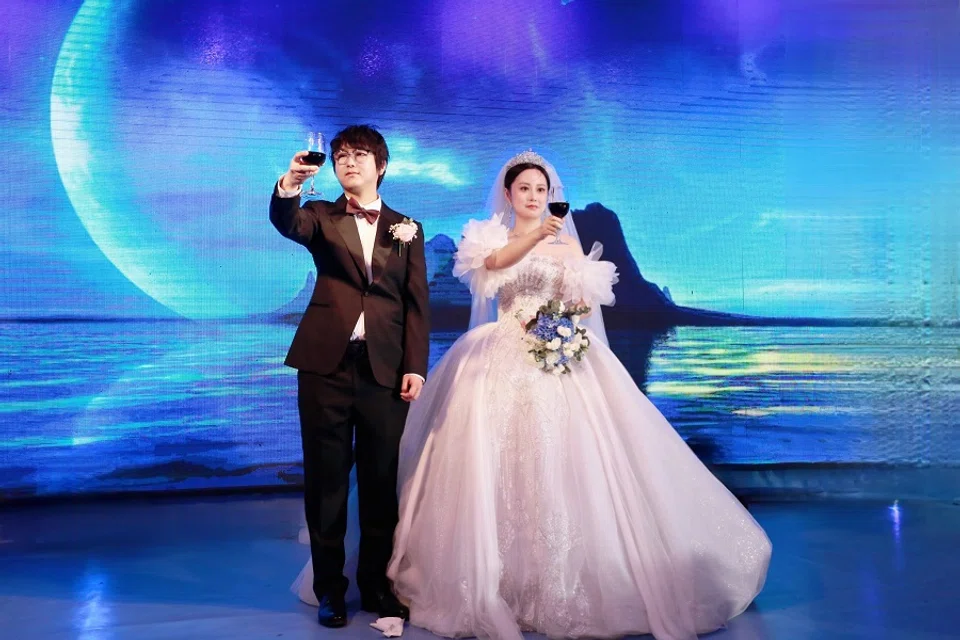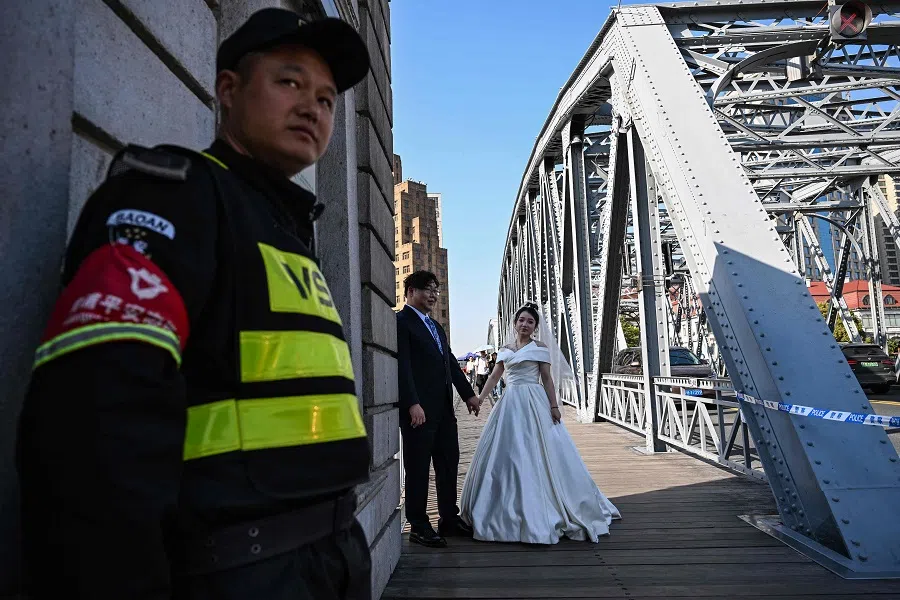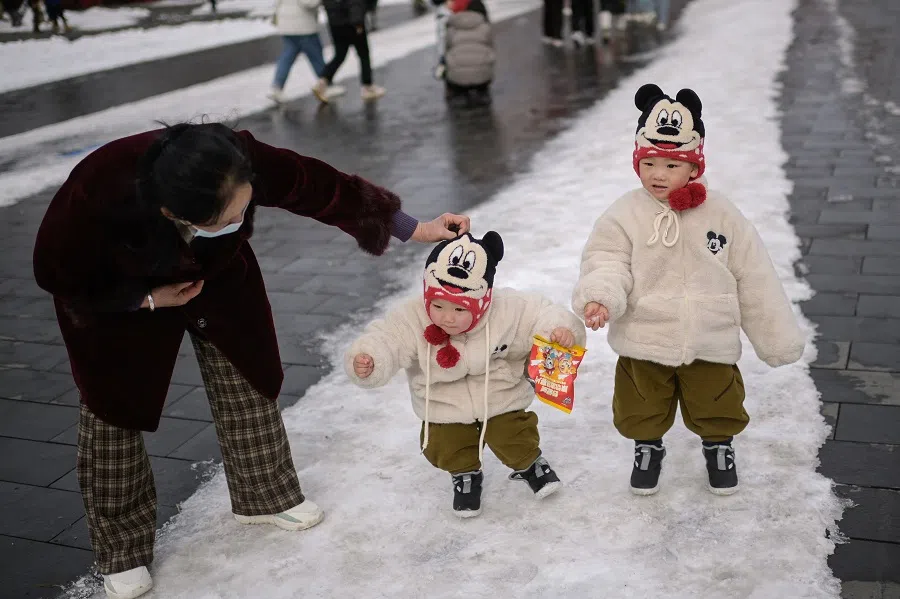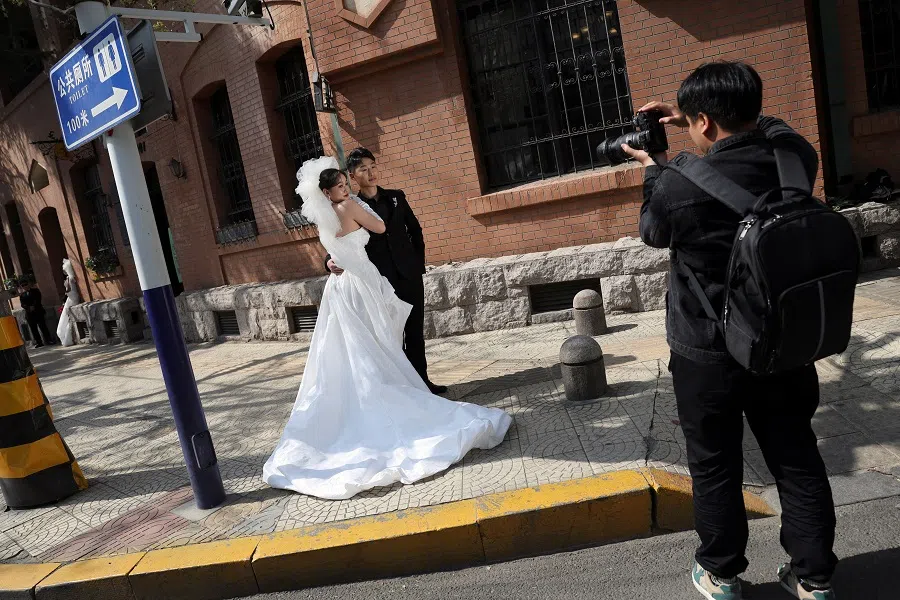Chinese youths are saying no to elaborate weddings
Chinese youths are giving pared-down weddings their thumbs up, knowing that this would rid them of impractical customs, high wedding costs and unnecessary angst. Lianhe Zaobao journalist Meng Dandan examines this trend.

No “fetching the bride” ceremony, no bridesmaids/groomsmen and no luxurious wedding cars. After endless discussions with both sets of parents, 28-year-old Feng Linrui, a white-collar worker from Beijing, held a “three Nos” wedding in her hometown of Anshan, Liaoning, during the May Day holiday.
Feng told Lianhe Zaobao that she and her husband really dislike over-elaborate traditional wedding customs; because of that, they had put off their wedding ceremony for as long as they could after registering their marriage last year.
However, with parental pressure mounting and out of respect for elder sentiments and local customs, the couple compromised. They agreed to incorporate some traditional customs into their wedding while opting for a simple ceremony whenever possible.
Young couples are drastically paring down traditional wedding rituals to their liking, and are holding extremely minimalistic weddings with three, four or even five “Nos”.
Simple does it
Young Chinese couples like Feng and her husband are increasingly going for minimalistic and simple weddings. They do not rent luxurious wedding cars and have abandoned the potentially embarrassing custom of “playing pranks” on newlyweds.
Some choose to be their own emcee at their wedding, while others do away with wedding gowns, make-up artists, photographers and so on. Young couples are drastically paring down traditional wedding rituals to their liking, and are holding extremely minimalistic weddings with three, four or even five “Nos”.

These pared-down weddings could include “Nos” like no “fetching the bride” ceremony, no fleet of wedding cars, no bridesmaids/groomsmen, no emcee, no tear-jerking segments or even no guests. It is up to the couple to decide what the “Nos” are.
During her wedding rehearsal, after going back and forth with the parents and the wedding planner, Feng and her husband managed to remove many superfluous segments. In her view, these practices represent many outdated mindsets that she is unable to tolerate.
Another pet peeve of hers is the custom where the father holds his daughter’s hand and gives her away to her future husband. This practice is also frowned upon by many other couples.
Questioning customs
Feng said, “‘Gate crashing’, finding and putting on shoes for the bride, having the bride sit on the bed while waiting for the groom to fetch her… these customs are extremely unnecessary so we have removed them all.”
Feng also omitted the part where the bride and groom confess their love for each other in front of everyone. She said, “This is something that’s very private to us, why should we tell the whole world?”
In her view, newlyweds are put on stage like performers in a show. “But who actually cares? Among the guests at 14 tables, the ones we both invited wouldn’t fill one table,” she remarked.

Another pet peeve of hers is the custom where the father holds his daughter’s hand and gives her away to her future husband. This practice is also frowned upon by many other couples.
Feng questioned, “Is this some sort of a passing of the baton from the father to the husband? If a close family member has to do this, it should be the mother, because the mother gives more to the family.”
Most of the youths think that a wedding costing between 30,000 RMB and 50,000 RMB is acceptable.
Practical considerations: Spending less
Apart from wanting a more relaxing and carefree wedding, youths are holding pared-down weddings because they want to cut down on expenses and have a more cost-effective wedding.
Feng and her husband saved on car rentals by doing away with unnecessary ceremonies and keeping the event in the hotel. Even so, the wedding cost over 60,000 RMB (about US$8,300).
While this amount is lower than the average amount spent on weddings in China today, it is still a considerable sum for young couples who have just joined the workforce and do not have much savings, especially if the young couple has to shoulder all the costs.

According to a 2023 report on the ideal wedding of youths published by Youth36kr (后浪研究所), a WeChat official account focusing on Chinese youths, Chinese youths spent an average of 147,500 RMB on their weddings. Most of the youths think that a wedding costing between 30,000 RMB and 50,000 RMB is acceptable.
Due to exorbitant wedding expenses, extensive planning periods and outdated practices such as the bride price, some youths could become afraid of getting married and may delay getting married, further exacerbating falling birth rates.
China’s population declined for the second consecutive year in 2023, with birth rates hitting record lows. To reduce wedding costs and reverse China’s falling fertility rate, Chinese officials are taking advantage of the pared-down wedding trend and ramping up their efforts to promote the benefits and necessity of simple weddings.
... some youths are simply registering their marriages and cutting out the wedding ceremony altogether.
Pared-down weddings encouraged by the state
Recently, a couple from Jiaxing, Zhejiang, was praised by state media for holding a wedding that cost only 5,000 RMB. This approach also gained much support on social media.
Practical Chinese youths are increasingly weary of hosting extravagant weddings that consume a lot of time, energy and money merely to avoid “losing face”. Apart from doing away with various wedding customs, some youths are simply registering their marriages and cutting out the wedding ceremony altogether.

29-year-old Yang Ziyu, who works at an internet enterprise, registered her marriage last year. She has no intentions of hosting a wedding ceremony. When she and her husband registered their marriage, they had only engaged a photographer to record the occasion of getting a marriage certificate at the Civil Affairs Bureau.
She said, “We’re not high-profile figures who need to do effective networking through events like weddings. Work is competitive enough and we don’t want our wedding to take time away from our rest.”
A study conducted by China Youth Daily’s social survey centre found that nearly 80% of young respondents support holding minimalistic weddings while over 60% think that the popularity of such weddings reflects the younger generation’s pursuit of individuality and freedom.
Chinese sociologist Ai Jun said when interviewed that minimalistic weddings not only suit the pace of life of today’s youths but also aligns with their need for simplicity and clarity. He thinks that hosting simple weddings is not about saying no to traditional weddings but returning to them.
He said that traditional Chinese weddings are not all the same and that most families host weddings according to their means, paying just enough attention to various customs. The so-called wasteful and extravagant weddings are actually just those of the rich and powerful.
This article was first published in Lianhe Zaobao as “化繁为简 中国年轻人流行“三无”婚礼”.





